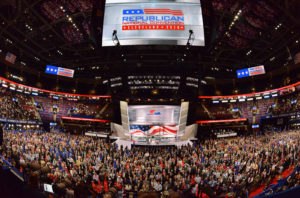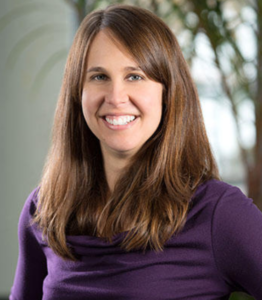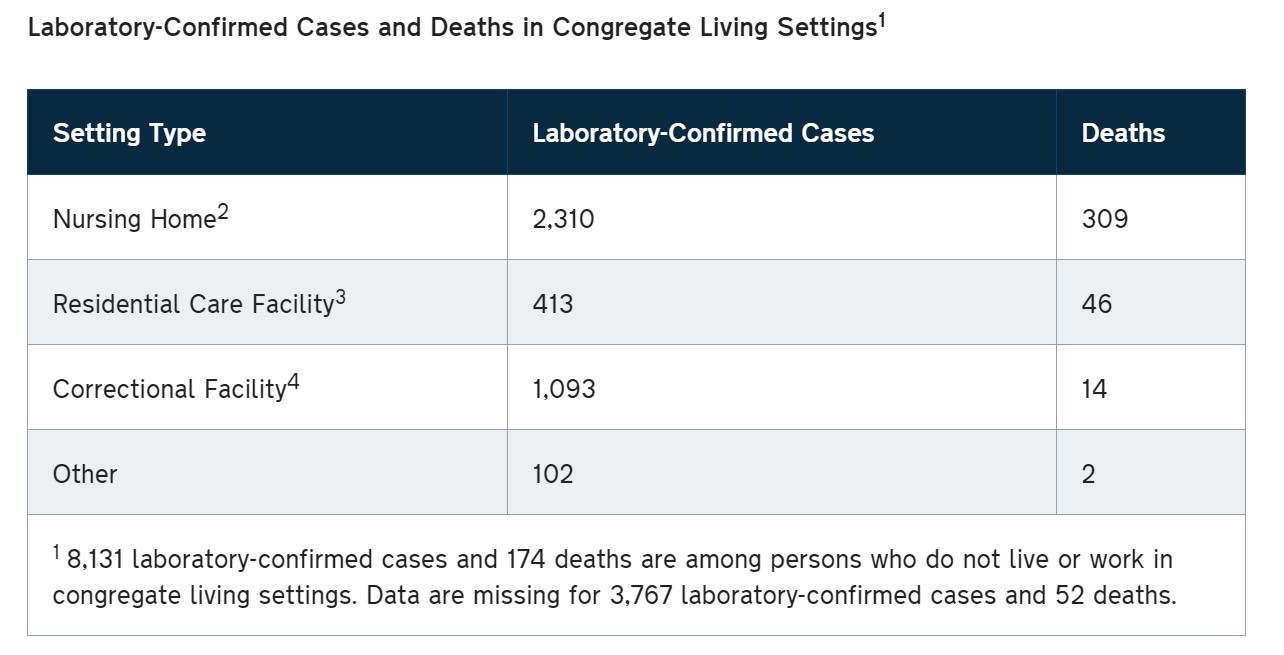COVID-19 Has Turned NC Politics Upside Down. We Try To Make Sense Of It.

In this week’s episode of Inside Politics, we’re going to look at the political news of the past two weeks – how COVID-19 may upend the Republican National Convention, Mecklenburg County’s efforts to get people to wear masks and how N.C. Gov. Roy Cooper has found a “sweet spot” politically in reopening the state.
For this week’s episode, we’re joined by Erik Spanberg, managing editor at the Charlotte Business Journal.
The first topic? The RNC, which is scheduled to take place at the Spectrum Center in 100 days.
Erik Spanberg: “Well I think it’s going to look different. There’s no doubt about that. Steve, you were probably on the call when Marcia Lee Kelly, who is the head of the convention, made the comment that, you know, the last thing they really wanted is that TV shot of people wearing masks, delegates in masks, but she all-but conceded that would be the case.

You know, one of the things that’s unspoken, is that the estimate if 50,000 people (attending). I think a lot of people realistically are looking at a much smaller number. You’re going to have media outlets that don’t send people. You’re going to have a much smaller corporate presence, I would imagine. Who’s going to want to put their executives in a possibly dangerous situation when you’re talking about public health?
Now, of course, we have some months before then, but it’s getting closer and closer. And the thing that stands out to me most about this RNC discussion of late is when the City Council took that vote, the 6-5 vote (to accept the $50 million federal security grant) and a lot of us seized on the Braxton Winston quote about, you know, to “stop the charade.” But the quote that really caught my attention was from Ed Driggs, the Republican who said, “I think it’s pretty obvious that there’s a good chance the convention is going to have to be modified and possibly even canceled.” And I think when you have Republicans saying things like this — and he’s not the only one — that really shows you that this is not going to be what everyone thought it would be, as recently as six months ago.

Steve Harrison: So the Democrats may pave the way for a virtual convention with the way the election shaping up. I mean, I think it’s going to be so unlikely that they have any sort of gathering in Milwaukee because they are going to be prosecuting the president on his handling of the virus. And so to me, it would be really difficult for them to get people together and then risk there being a spike of infections, and kind of undermining their whole case against President Trump. So that’s where I see them going. But I’ve kind of wondered with the RNC, whether the president might take his show on the road. Are there going to be states that are going to allow him to speak to a whole lot of people?
Lisa Worf: One thing I wonder about is maybe he does come to Charlotte and the convention is here — but it’s basically the president virtually from Charlotte. And so you can still check off the boxes and you don’t have to worry about holding a super-spreader event.
Spanberg: Yeah, I think that both of you are correct with this idea of a dramatically scaled-back convention, but enough of a convention so that everyone can kind of save face and say Charlotte had the RNC. And maybe the president speaks virtually, maybe the president goes to some football stadiums in the region and speaks.
You know, I could certainly see a governor in a “red state” saying, “You know what? If they don’t want to do it full bore, we will,” kind of thing. But I think that when you bring it back closer to home here in Charlotte, one of the things that will be pored over pretty closely is this was advertised as an event that would bring in 50,000 people and generate $120 million. And when you’re talking about a battered tourism sector when those things don’t come to pass, understandably, it’s still going to be, I think, a little bit of indigestion for some people,
Worf: If the RNC were a virtual event, what would have to change in order to make that happen?

Harrison: I think the Republican National Committee would have to change its rules to allow delegates to vote remotely. And that’s something that they haven’t been willing to talk about, because of course, they’re still going full speed ahead. You know, this convention is August 24. So the big date is you get around July 1, early July, mid-July. That’s the fish-or-cut-bait moment, right? Because you have to start building the stage and really getting ready and spending money.
Worf: I think about that $50 million grant for security and what that means when you’re juggling all this uncertainty, how you pull down that money and how you spend that money?
Spanberg: I think there are a couple of interesting sidebar stories that we’ve seen here in recent days. You had the hiring of the doctor who served in the W. Bush administration (Jeffrey Runge) who is helping the RNC try to navigate public health as far as the convention. And then you had the development with Louis DeJoy, the Greensboro businessman who has been named Postmaster General. He’s the lead fundraiser for the local organizing committee. And when I spoke to John Lassiter, the CEO of the organizing committee, one of the things he said was that they hope to be at their $70 million fundraising target by mid-June when DeJoy leaves. And I said, “Well, so where are you now?” And he said, “We’re over $50 million.”
And I know the Trump campaign has done very well, but that’s a lot of money to raise. And particularly at a time when even Lassiter said it’s really difficult to do this virtually — you don’t have the typical fundraisers. You don’t have, you know, the sort of the typical back-slapping events that really get people to open up their wallets. So I think you’ve got a lot of moving parts as you head toward that July 1st day that Steve is talking about.
Worf: Now as far as reopening North Carolina — we’re now in Phase 1, which means many businesses can open and they did that over the weekend. SouthPark Mall and Concord Mills had lots of people — and many not wearing masks. And that’s something that the state and Mecklenburg County health officials have urged, but they haven’t required at this point. What’s that debate been like? I know, Erik, you’ve listened to it on the local level.
Spanberg: Yes, Mecklenburg County has this business roundtable. It’s a group of 40 civic and business leaders. Dena Diorio, the county manager, leads the meetings, and this week they were talking about what you just mentioned, the opening weekend. Diorio had been out to SouthPark Mall and other people had been out and about and they were alarmed by the fact that people are not wearing masks or not enough people are wearing masks.
And I think one of the really interesting aspects of this is when you look at what’s happened with the county, remember, they had a much more stringent stay-at-home order (that the state’s). And then late April, they went into the state and the governor’s three-phase, reopening plan. And I think the political dynamics of the county sort of saying, “OK, we’re going to have to ease up here” — that feeds into the fact that there is not a mandate and they’re not going to have a local mandate.

Harrison: If you go back to late March when stay-at-home started, I think people were really scared. I think across the board, whether you’re a Democrat or Republican, I think there was a genuine real concern about this. But as the weeks have gone on in terms of seeing more data, flattening the curve, etc., it’s harder for top-down public health mandates to take hold.
And part of that is just people kind of going into their own partisan camps and digging in their heels. That’s part of it. But I do think it’s also people who have looked at the data and seen that the curve has flattened and hospitals aren’t going to be overwhelmed. And they’re starting to make some decisions of their own.
Spanberg: I think that you know, it’s just the basic human factor of people having cabin fever and getting stir crazy. And I think that makes people — or at least a portion of people – to just say, “You know what, I’m tired of this. I’m just going to go do what I want to do.”
And that may be potentially very dangerous and harmful in terms of public health, but I think there is a fair amount of that mentality out there right now.
Worf: Yeah. And I think back to what you were saying, Steve, as far as some of the numbers and the data, and you keep on seeing, you know, such flattening that the peak keeps on being pushed out further and further. There isn’t this urgency anymore. You know, there’s this thought of, how do you live a normal life if this is still going to be continuing for many, many months?
Harrison: The county has been running a model for the past five or six weeks forecasting this huge dramatic increase in cases and the hospitals being overwhelmed. And first, it was going to be overwhelmed in mid-May, then June and now July 14. And I talked to one of the creators of the model the county’s using from the University of Pennsylvania, and he said the model isn’t appropriate to use anymore. This model is geared for the beginning of an outbreak, not where we are now, where cases have leveled. So, you know, modeling is hard, predicting the future is hard. But it seems like in this case, the idea of this huge explosion of cases in the hospitals that being overwhelmed doesn’t seem like it’s going to happen — at least based on how people are behaving today.
Worf: Back to that model. What was the county’s response about why they are using that still at this point?
Harrison: The deputy health director said that he interprets the guidance on the model as being a little different. He says that the model says you’re not supposed to use it past peak infection. And the county’s interpretation was the peak infection was the point where more people have been infected than are susceptible. So if you think about that in Mecklenburg County, I mean, that’s half a million people, 600,000 people. And then the University of Pennsylvania said, “No, we don’t see it that way. We see it as the point at which new cases start to level and you’ve hit a plateau,” — which is really where Mecklenburg is.
Spanberg: And I think another thing that’s going on here is, Steve, you’re absolutely right about the numbers. But I think that we’ve heard so much about the surge and flattening the curve, that I think in the minds of many people they almost think like, “Oh, OK, well, there’s nothing to worry about.” But it’s not gone. It’s not like cases aren’t going to continue. And there won’t continue to be sick people. But I think in the minds of the public from focusing on those factors so much they just think, well, this thing goes on its way out.
Worf: What is the case for not requiring people to wear face masks? What is the state and Mecklenburg County giving as their reasoning for not doing that?
Spanberg: That’s a good question. Steve, do you know the answer? I mean, from listening to the conversations, I heard (Mecklenburg County Public Health Director) Gibbie Harris and the county manager just saying, in essence, “Well, we don’t have a mandate. We’re not going to have a mandate, but we’re going to try, you know, public information and awareness campaigns.” But they never really gave any concrete reason as to why they chose not to do that.
Harrison: Yeah, it’s a good question. They were allowed to deem businesses essential, nonessential, and limit the size of gatherings. It is an interesting question whether if they wanted to, could they do a mask mandate? And I don’t know, I mean, legally, would that fly?
Worf: Other cities have been doing it, right?
Spanberg: Well, and it’s also been interesting, Lisa. Dena Diorio mentioned that Sen. Thom Tillis had told her during a phone call this week that he’s in favor of businesses having sort of “no mask, no service” signs, to put pressure on people to wear those masks. And so it’s, I think, from the political side, they want the businesses to handle it. And then there was a retail lobbyist, who was also part of this meeting, who said “Well, the last thing businesses want to do after they’ve been closed, and they’re under all this financial pressure, is to alienate any potential customer.” And also, he gave an example of teenagers working in the store and having to tell people who are as old as their parents, “You have to wear a mask or you have to leave.” So if there’s a lot of hot potato going on here.
Harrison: I think the Tillis thing is just is so interesting that you know, if you look at across the state, most of the elected Republicans are really moving away from Cooper and supporting his plan to reopen. But Tillis is taking this almost completely different position. I mean, if you listen to his town halls — he’s been doing a lot of these telephone town halls with constituents — he has supported the governor talks about the importance of flattening the curve public. And then this idea, like you said, that he would like businesses to have, you know, the “no mask, no service.” He’s just gone off in a completely different direction than the rest of his party in North Carolina. And I think we’ll probably talk about that a little bit later. But it’s just fascinating to me that that’s the route he’s taken.
Spanberg: Yeah, I agree. But I do have to wonder what Phil Berger and Tim Moore and some of his other former colleagues in the North Carolina legislature might be thinking. Is this divergence in partisan opinion beginning to creep (them) out? So we’ll see.
Harrison: I think it’s been really interesting that Gov. Cooper seems to have found this kind of sweet spot where he has let the other Southern states like Georgia, Tennessee, go first. And North Carolina seems to be kind of drafting behind them. And he’s been able to not get a lot of attention put on him as the state starts to reopen.
Spanberg: Well, yeah, I think there are so many interesting threads to this. One of them is we were talking about this Washington Post story. We were talking about it in terms of the popularity of governors versus the president and Roy Cooper was right up there 74% approval in terms of the way he’s handled this. And there was another development this week that really showed me, I guess some of the political aspects of this. Dan Forest is the lieutenant governor who of course, is the Republican running against Roy Cooper. He wrote a letter with five other Republicans who are members of Council of State asking for them to have a larger role in the reopening — which tells me that they want to have more say and they want to have their perspective out there because Roy Cooper’s taking a lot of the limelight right now.
Harrison: I think it goes back to what we talked about just a little while ago with Thom Tillis kind of supporting him. I mean, I think I think for Sen. Tillis, you can have two things. One, he believes that going slow is the best policy in terms of public health. But at the same time, I’m sure they’ve looked at the numbers and seen that Gov. Cooper is very popular, and that’s not a bad place to be.
Worf: Yeah, it’s certainly an intriguing time about how do you campaign in a time of Coronavirus? Especially when you are the challenger as Dan Forest is and Cal Cunningham? Where do you fall on this?
Spanberg: Well, I think it’s gonna be really interesting to see as we get closer to the election, can Tillis maintain this – support of Cooper might be an incorrect phrase — but aligning with the governor’s strategies? And at the same time, obviously, he has to be careful not to alienate the base, the Trump voter. And Thom Tillis, better than anyone knows what the risks are there. So it’s going to be a really interesting conversation to see how he tries to thread that needle.
Harrison: I said earlier that the governor has found this sweet spot in terms of reopening. And I think it’s interesting because, you know, he’s going like 10 days, 14 days behind these other Republican governors. And if you look at the data in North Carolina, in terms of the trends of new cases, things like that, it’s just not that much different than where Georgia was, where Tennessee is. And so he has just been able, though, to let them take the heat from the national media, local media, and even though things aren’t that much different North Carolina,
Worf: With cases still going up …
Spanberg: But as you say, Steve, he looks like the adult in the room when you see Gov. (Brian) Kemp in Georgia, you know, opening the gyms and the salons and when you see South Carolina being much more aggressive. Gov. (Henry) McMaster said this week they’ll open some of those same sorts of crowd-intensive stores. So he’s surrounded by these states that have been so much more aggressive. And in the eyes of some voters, they’ve been more irresponsible or risk-taking. And so I think that the governor is benefiting from all of those things.
Harrison: It’s interesting that when you look at the data, Mecklenburg has the most cases, by far of any county. But then at the same time, I could make an argument, that Mecklenburg shouldn’t be one of the first to move into Phase 2, just based on hospitalizations going down and the number of new cases. It’s interesting. There are so many different ways to look at the numbers.
Spanberg: Well, as you say with those numbers, it is interesting. For example, one of the things that stood out to me is particularly early on in the pandemic, and through much of March, you know, Mecklenburg County was 18, 20, 25, creeping up to 30% of the cases statewide. And more recently, I think they’ve been in the 14% range, something like that, perhaps a little bit lower in terms of the percentage of positive cases. So it really is one of those things, all these numbers, you can look at them in so many ways. So it really does become all in the eye of the beholder, I think.
 Worf: Steve, you spoke about the meatpacking places. And you look at nursing homes and residential facilities. And right now, I mean nearly 60% of deaths in North Carolina have occurred with people associated with those places. And that’s really throughout the state.
Worf: Steve, you spoke about the meatpacking places. And you look at nursing homes and residential facilities. And right now, I mean nearly 60% of deaths in North Carolina have occurred with people associated with those places. And that’s really throughout the state.
Harrison: You know, we talked a little bit about Dan Forest trying to get other Republican statewide leaders to kind of join him and I think he is struggling now to breakthrough. But he is laying down this marker of saying reopening is going to0 slow and, you know, his opportunity will be if people get tired of the virus or – if the virus is not front-and-center – and these unemployment numbers are still sky-high.
Spanberg: Yeah, well, I think the first thing is that unemployment numbers will be sky-high. And this is not something that is going to be solved in a matter of months. And, you know, we spent so much time justifiably talking about the scale and scope of the pandemic numbers. But when you look at these unemployment numbers here in North Carolina … I’ll just give an example. The lowest number of unemployment claims basically, in the last six weeks was on Sunday. It was about 5,800, give or take. Well, before the pandemic, a typical week of North Carolina unemployment claims was 2,500 to 3,000. And you’re just seeing that times a zillion almost day after day after day; 1.1 million people have filed unemployment claims since March 15. So it’s just a scale that we have never seen.
Worf: What happens with the state’s ability to keep on paying those claims?
Spanberg: Well, watch this fight. North Carolina has one of the lowest maximum payouts for unemployment, it’s $350 a week. Now that’s been padded considerably right now with the coronavirus funding, it bumps that up to plus-$600. But that ends at the end of July. There’s already a conversation in the legislature of should they go from $350 to $400 for the max. I mean, you know, $50 is not a whole lot, obviously. So if that’s a difficult conversation, and yet you have all of these hundreds of thousands of people that we’re talking about, trying to figure out what to do next.
You’re about to get into a very heated political debate.
Click here to subscribe to the Inside Politics podcast (and to give the podcast a rating/review in your favorite podcast app).
Want more? You can sign up here for our weekly Inside Politics newsletter, written by Steve Harrison.
Have a question about the 2020 RNC in Charlotte? Ask us below.